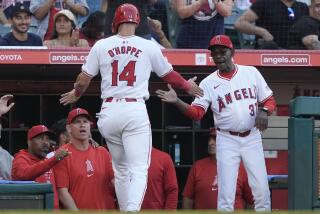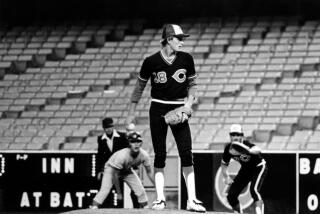Remember the Name: It’s Urbano Rafael Lugo : But No Matter What He’s Called, His Calling Is Pitching, as Angels Discover
- Share via
If you’ve been following the box scores and the Angels’ rather precarious existence atop the American League West standings, you probably have questions about this man Lugo, the newest name in a pitching rotation that suddenly is emphasizing newness.
You already know about three--perfect-game artist Mike Witt, player representative Ron Romanick and reformed hockey player Kirk McCaskill.
But Lugo . . .
First off, which is it-- Rafael Lugo or Urbano Lugo? Writers and broadcasters have been flipping a coin over that one all season.
And about that bread-and-butter pitch of his. Is it really just a “forkball”--or maybe something enhanced by some substance imported from his native Venezuela?
And how were the Angels able to track him down in South America and lure him away from Caracas, where his father, Urbano Lugo, Sr., had one of the greatest pitching careers in Venezuelan baseball history?
And how come the Chicago White Sox can’t hit him?
And, finally, why is this soft-spoken, well-mannered 22-year-old rookie--with precisely five innings of Triple-A experience to his credit--taking a 2-1 record and a 2.03 earned-run average into his fourth start Saturday night at Kansas City?
First things first. Let’s get the name right.
You can call him Rafael (as his minor league pitching coach did), or you can call him Urbano (as his professional contract reads), or you can call him Urby (as his Angel teammates do).
But to clear up any and all confusion, Lugo politely requests that you address him as Urbano.
“That’s my name--Urbano Rafael Lugo,” he says. “I was named after my father.”
This name business became fouled up during Lugo’s first spring training in the United States, when he was initially introduced to pitching coach Frank Reberger, now with the Edmonton Trappers.
Reberger didn’t care much for Urbano --couldn’t pronounce it, in fact--so he asked for a middle name. Lugo told him Rafael.
That, Reberger could pronounce. And thus, a pitcher was named.
“It was no problem,” Lugo says, with an easy smile. “He could call me Rafael. But when I got here (the Angels), I wanted to use my first name.”
So there it is, for the record.
Lugo would also like to quell this budding controversy over the dryness of the baseball once it leaves his pitching hand. Angel bullpen coach Bob Clear calls Lugo’s No. 1 pitch “a true forkball, with excellent spin,” but the Chicago White Sox, who are 0-2 against Lugo, aren’t so sure.
Following Lugo’s 6-3 victory last Saturday at Chicago, White Sox catcher Carlton Fisk accused Lugo of throwing a spitball.
“I don’t know what all that wet stuff was coming off the ball as it came up to the plate,” Fisk told Chicago writers.
Lugo smiles again when confronted with such charges.
“You can check the ball any time,” he said. “I only throw a forkball and a fastball that moves around sometimes. A forkball can move like a knuckleball. It goes over the middle of home plate, and then it goes down hard.
“If Fisk thinks it’s a spitball, he should have the umpire go to the mound and check the ball. I got him out on a hard fastball inside.”
Angel Manager Gene Mauch, of course, supports his pitcher.
“It’s amazing Fisk could pick that up the very first time he saw him,” Mauch said. “Lugo’s ‘a cheater.’ Right. He wouldn’t know where to start to throw a spitter. It’s not unusual for a hitter, when he’s made to look bad, to say the pitcher is cheating.
“And, besides, a pitcher usually resorts to a spitball because he has no confidence in his stuff. That’s the absolute truth.
“Lugo has no confidence problems. He trusts his stuff and goes right at the hitters.”
Lugo says he has been throwing the forkball ever since his teen-age years.
“I saw some pitcher show how to throw one on TV,” Lugo said. “We get the major league Game of the Week in Venezuela.”
Lugo doesn’t remember which pitcher it was. Might have been Bruce Sutter. He isn’t sure.
“I started practicing it,” he said. “Then, when I went to Caracas (to pitch professionally), I worked on it more, getting my elbow turned down right.”
When Lugo signed with Caracas in 1980, it marked more than the team’s acquisition of a new player. It was the beginning of a second generation of Lugos with the Caracas franchise.
Years before, Urbano, Sr., had pitched for the same team, with outstanding success.
When Urbano, Jr., came of age, it was akin to Mickey Mantle’s son joining the Yankees. Lugo even wore the same number as his father--No. 8.
But Lugo denies he felt any pressure.
“Nah, I just tried to be myself,” he said. “I just went out and pitched. It made no difference.”
Father and son have traded pitching secrets on occasion, Lugo said.
“He showed me how to throw his curveball and I taught him my forkball,” Lugo said, laughing.
Unlike his father, however, Lugo made the trip to the United States to pursue his baseball career. Urbano, Sr., pitched a total of 13 years, all in Venezuela and Mexico.
“He started pitching when he was 24, 25,” Lugo said. “He had some (American) scouts look at him, but he felt he was too old to leave and try to make the major leagues.”
The younger Lugo was spotted by Angel scouts on a recruiting trip during the winter of 1981. Upon the recommendation of Venezuelan correspondent Pompeyo Davalillo, the team’s director of scouting, Larry Himes, made the trek south to watch Lugo pitch.
After 20 minutes of forkballs, fastballs and curveballs in the bullpen, Lugo had sufficiently impressed Himes. Later in the day, Lugo signed an Angel contract.
By 1984, he was in double-A, pitching for Waterbury, where he fashioned a 13-8 record with an earned-run average of 2.79. A Baseball America magazine poll rated him the top pitching prospect in the Eastern League.
That helped earn Lugo an invitation to the Angels’ training camp this spring. His numbers weren’t much--1-2 in six games, 6.75 ERA--but he did manage to leave an impression with the Angel coaches.
“He showed a great deal of confidence in his ability to throw strikes,” Mauch said. “He does not hide the ball from the bat.
“It’s pretty unrealistic to have so many first-year pitchers on your staff (the Angels have four--Lugo, McCaskill, Pat Clements and Stu Cliburn), but as I said in the spring, I’ve never seen so high a number of young quality arms in one camp.”
When Ken Forsch and Geoff Zahn fell victim to injury, and Tommy John fell into disfavor, the Angels began calling on those young arms. Lugo got his promotion April 25, after working just five innings in an Edmonton uniform.
He didn’t exactly take the pitching staff by storm. Assigned to the bullpen, Lugo made just six appearances in a month-and-a-half. He pitched 13 innings in that span, allowing two earned runs--both on home runs.
Finally, on June 11, Lugo made his first start. He yielded two earned runs in four innings against the Texas Rangers before he was forced out of the game with a blood blister on his right index finger. Lugo was credited with the loss in a 6-4 Angel defeat.
Then came the White Sox. Two starts against Tim Lollar, two victories for Lugo. He pitched eight-plus innings in a 3-1 triumph on Old-Timers Day at Anaheim Stadium and six-plus innings last weekend at Chicago.
People may still be trying to figure out precisely what to call this hard-throwing rookie, but he certainly caught the White Sox’s attention. The Cleveland Indians’, too.
In trade talks with the Angels regarding veteran pitcher Bert Blyleven, the Indians were said to be interested in a couple of the team’s young prospects. Lugo, reports kept saying, was one of them.
Banishment to Cleveland is not exactly what Lugo had in mind when he signed with California. But, if he was now being showcased for the Indians, so be it, Lugo said. He was simply trying to pitch well enough to stay in the major leagues.
“I only heard about it (the trade rumor) in the newspapers,” Lugo said. “No pitching coach, nobody in the office told me. Nobody told me nothing.
“I didn’t think about it out on the mound. If I go to another team, I go. But I like it here--the best players are here, my wife likes it here. Maybe, if I throw well enough, they’ll want to keep me. You never know.”
So far, the feeling is mutual between Lugo and the Angels. This is a team in transition, particularly in regards to pitching.
And Lugo has helped breathe new life into a staff that appeared in tatters only weeks ago.
You could call it Urbano renewal.
More to Read
Go beyond the scoreboard
Get the latest on L.A.'s teams in the daily Sports Report newsletter.
You may occasionally receive promotional content from the Los Angeles Times.






